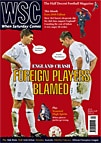 Robert Shaw reports on how Flamengo seek to change history and become 1987 Copa União champions, beating rivals São Paulo to five National Championships
Robert Shaw reports on how Flamengo seek to change history and become 1987 Copa União champions, beating rivals São Paulo to five National Championships
Two popular Brazilian clubs, Flamengo and São Paulo, are at loggerheads over a title. Not this year’s national championship, which São Paulo won with four games to spare, but the Copa União of 1987. Official champions that year were Sport from Recife, but Flamengo argue that the title should go to them. São Paulo were recently given a special trophy for being the first team to win five national championships – this year’s title adding to those of 1977, 1986, 1991 and 2006 – while Flamengo are still on four, years after the disputed season. The commemoration of São Paulo’s penta (fifth) by the Brazilian federation (CBF) prompted an exchange of letters, a media campaign and a plague of rival T‑shirts. One São Paulo fan spent the equivalent of £1 million extolling his team on billboards in the capital Brasilia, while Flamengo legend Zico complained: “Everyone knows that the CBF did not recognise Flamengo’s title due to political disputes.”